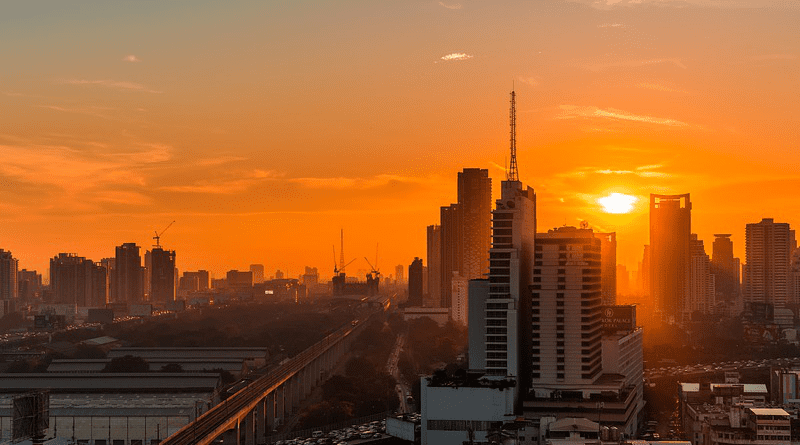New Thai Travel Requirements Could Dampen GDP Forecast Growth – Analysis
Unstated fear of Chinese arrivals behind decision
Thailand’s vital tourism industry, just emerging from months of coronavirus stagnation looks likely to be crippled by an announcement by deputy prime minister and health minister Anutin Charnuirakul, likely driven by fear of Covid-bearing Chinese arrivals, that all visitors at some point will be required to show proof of at least two vaccinations and have health coverage that includes Covid-19 treatment upon arrival.
In addition, incoming tourists at an as-yet-unannounced date will be required to wear a mask in public places and transport, and take a rapid antigen test if they develop Covid-19 like symptoms during their stay. There has been no date set for the requirements become mandatory.
Some expatriates claim their vaccine certificates are no longer be retrievable in their phone apps, and many are wondering how authorities will enforce the mask mandate selectively upon incoming foreigners, with those already in Thailand not mandated to do so, as all mandates were lifted last October when Covid-19 was declared endemic. There is a possibility that this requirement will raise the level of local xenophobia towards foreigners.
The scrapping of all Covid-19 entry requirements late last year led to a surge of tourists across the border from Malaysia, Cambodia, and Laos creating a dramatic increase in economic activity in border provinces. Every hotel in Hat Yai, just north of the Malaysian border, was full over the new year holiday period. Arrivals from Thailand’s immediate neighbors to the beginning of November were made up of 1.24 million Malaysians, 373,811 Cambodians, 538,789 Laotians and 365,593 Singaporeans.
The comments sections in Thai English language news portals indicates that many are already wary of what happened during Thai restrictions over the last two years and are hesitant to return, stating there are now more tourist-friendly destinations in neighboring countries. The lack of detail on the new requirements is confusing potential incoming tourists.
There has been much apprehension over the expected arrival of Chinese tourists after the Chinese government lifted the requirement for quarantine upon return. Those in the Phuket, Pattaya, and Chiang Mai tourist regions were excited for bumper Chinese New Year business. However, news stories coming out of China has scared the local Thai population.
Sensitivity towards China has partly driven Anutin’s move to reinstate the restrictions. The US, UK, most EU states, Canada, Australia, and India infuriated China, which condemned the restriction of travellers from its territory, as unacceptable.
Outspoken physician Dr Yong Poovorawan’s comments that “Covid from the West is more dangerous than that from China”, led to outrage by non-Thais on social media. It appeared he was trying to politically justify Anutin’s edict, rather than base his comment upon data.
Most ASEAN countries have taken a soft approach, not wanting to anger China, by introducing cosmetic restrictions upon all incoming travellers through fever checks. Malaysia is analyzing wastewater from aircraft coming from China on the pretext of searching for new Covid variants. This has placated Chinese authorities. Anutin claimed that Thailand’s move to re-establish vaccine requirements for all foreign tourists was non-discriminatory, and not profiling any country.
Thailand has taken more stringent actions, which run the risk of dampening the tourist sector, which was progressively recovering. The Tourist Authority of Thailand (TAT) had estimated that 20 million tourists would visit Thailand in 2023, but now this could be in question.
TAT expected 300,000 Chinese tourists in the first quarter of this year. However, excessively high airline prices, and the requirement to take a PCR test upon return to China, may disappoint these expectations.
The Asian Development Bank (ADB) forecast 2.9 percent GDP growth in 2023, up from 1.9 percent in 2022. However, the new requirements announced by Anutin may deter visitors. Many remember the red tape and bureaucracy from 2021, when Thailand opened the ‘sandbox’ scheme, and would prefer a less risky destination. Many tourists are changing their plans. Indian tourists now have to take a PCR test upon return as well, which could dissipate the Indian market.
Even if the new requirements are only short term, the whole high season would suffer this year.
Tourism amounted to 19 percent of Thailand GDP in 2019, falling to 5 percent in 2022, mostly made up by domestic tourism. With the new restriction further growth of the tourism sector will be fragile.
As the world is moving on from Covid-19, many countries are abandoning the vaccine program. Thiravat Hemachudha, director of Thailand’s Red Cross Emerging Infectious Diseases Health Science Center said it was now time to live with Covid, and for the people to not fear being infected, as the disease has already been declared endemic in Thailand, when all restrictions were lifted.
Wastewater analysis in Thailand has determined that the strains circulating in China, BA5.2 and BF.7 have been in Thailand for some months, and no explosion in cases has occurred. As the levels of immunity are higher in Thailand than China, experts believe the surge in cases occurring in China will not be emulated in Thailand.
Tourist arrivals are unlikely to overload the Thai health system as feared, with the government continually monitoring the situation.
Generally, however, Thais are pleased with Anutin’s decision due to fear of the coronavirus. This should bolster Anutin’s popularity along with his Bhumjaithai Party, facing a very tough election in the next few months.
The new mandates now await cabinet approval, which may not get through, due to domestic political considerations.
Originally published in the Asia Sentinel 6th January 2022

